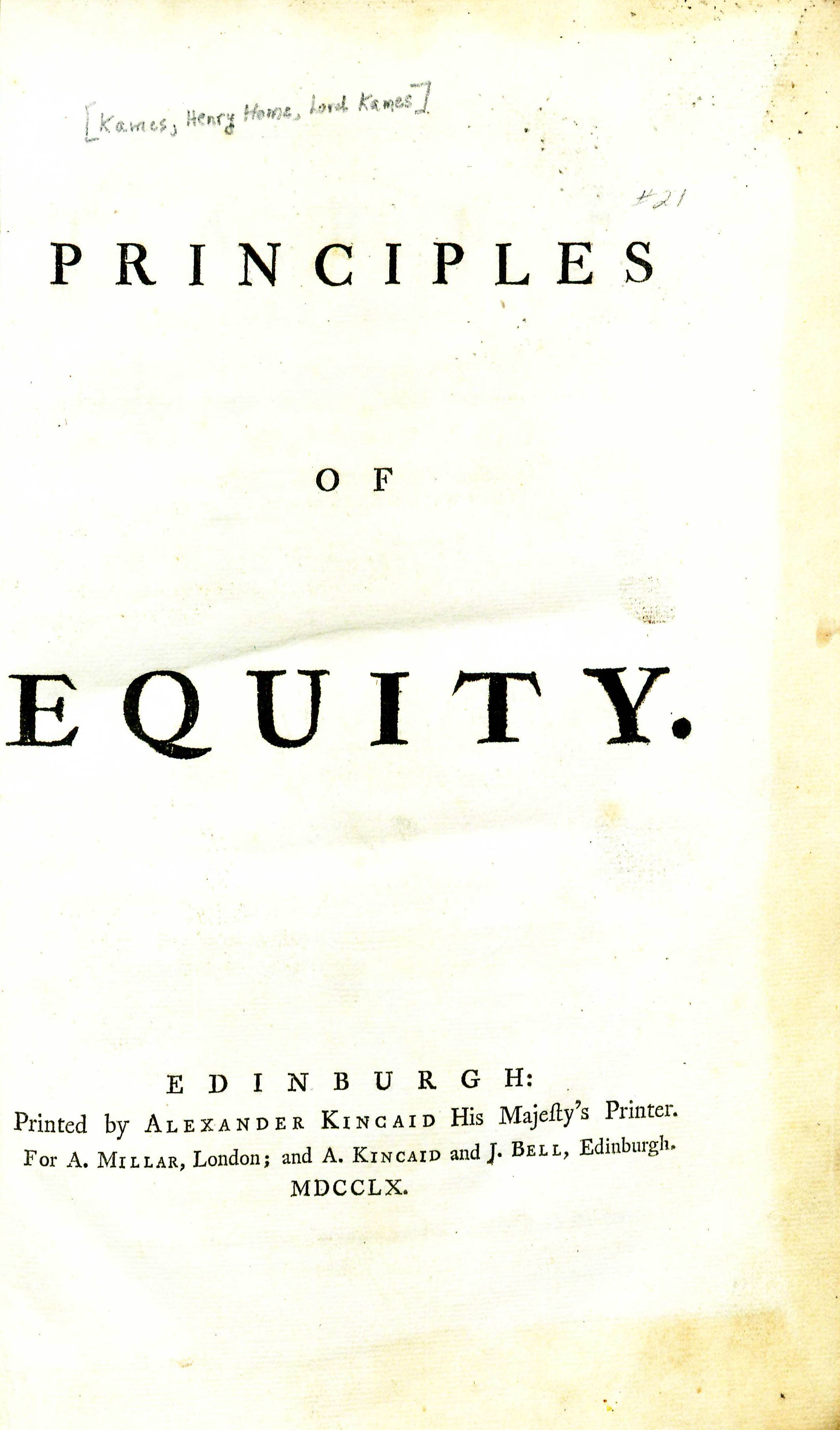Difference between revisions of "Principles of Equity"
Lewarkentin (talk | contribs) (→See also) |
(→See also) |
||
| Line 29: | Line 29: | ||
*''[[Essays on the Principles of Morality and Natural Religion]]'' | *''[[Essays on the Principles of Morality and Natural Religion]]'' | ||
*[[George Wythe Room]] | *[[George Wythe Room]] | ||
| + | *''[[Historical Law-Tracts]]'' | ||
*[[Jefferson Inventory]] | *[[Jefferson Inventory]] | ||
| − | |||
*[[Wythe's Library]] | *[[Wythe's Library]] | ||
Revision as of 15:03, 9 September 2015
by Henry Home, Lord Kames
| Principles of Equity | |
|
Title page from Principles of Equity, George Wythe Collection, Wolf Law Library, College of William & Mary. | |
| Author | Henry Home, Lord Kames |
| Published | Edinburgh: Printed by Alexander Kincaid, His Majesty's printer. For A. Millar, London; and A. Kincaid and J. Bell, Edinburgh |
| Date | 1760 |
| Edition | First |
| Pages | [10], xviii, 289, [15] |
| Desc. | Folio (33 cm.) |
| Location | Shelf K-5 |
Henry Home (1696–1782), later known as Lord Kames, was a key figure in the Scottish Enlightenment. His written works primarily addressed legal matters, but extended to include philosophy, history, religion, and literature.[1] Born into a large family with a great deal of debt, Home was never formally educated at university, but he trained under James Craig at a civil law college while continuing to study such topics as the classics and additional languages on his own to make up for the deficits in his education.[2] Notably a hard worker of high intellect, Home eventually developed a respected legal practice after being appointed to the bar in 1723. Around that time, he began to write at length on legal topics, a practice that continued even after his ascension to the bench in 1752.[3] In 1763, Lord Kames (Home) reached a long-time goal when he was appointed to the justiciary, Scotland’s criminal court.[4] Kames remained active and possessed of his characteristic cruel wit up until his death in 1782.[5]
Kames’ Principles of Equity (1760) represented the first detailed, written study of equity in English,[6] and Scottish legal historians consider it to be his major work.[7] In it, Kames intended to evaluate, compare, and reconcile the differing legal systems of jurisprudence of England and Scotland.[8] Although the work was theoretical, Kames devoted some attention to more practical matters, including a discussion of the rules governing bankruptcy.[9] Well received in its time, Principles of Equity served as a source cited by both Scottish and early American lawyers.[10]
Evidence for Inclusion in Wythe's Library
Listed in the Jefferson Inventory of Wythe's Library as Kaim's Pr. Eq. fol. and given by Thomas Jefferson to Dabney Carr. Two folio editions of this title were published.[11] The Brown Bibliography[12] includes the 1760 edition while George Wythe's Library[13] on LibraryThing indicates "Precise edition unknown. Folio editions of this work were published at Edinburgh in 1760 and 1767." The Wolf Law Library moved a copy of the 1760 edition from another rare book collection to the George Wythe Collection.
Description of the Wolf Law Library's copy
Recently rebound in period style. Spine features four bands with gilt rules and green labels. Purchased through the generosity of Daniel W. Baran and Lena Stratton Baran, Class of 1936.
View the record for this book in William & Mary's online catalog.
See also
- Essays on the Principles of Morality and Natural Religion
- George Wythe Room
- Historical Law-Tracts
- Jefferson Inventory
- Wythe's Library
References
- ↑ "[www.scottishphilosophy.org/lord-kames.html Henry Home, Lord Kames (1696-1782)]" on International Association for Scottish Philosophy website, accessed October 22, 2013.
- ↑ Alastair J. Durie and Stuart Handley, "Home, Henry, Lord Kames (1696–1782)" in Oxford Dictionary of National Biography (Oxford University Press, 2004- ), accessed October 22, 2013.
- ↑ Ibid.
- ↑ Ibid.
- ↑ Ibid.
- ↑ Daniel James Carr, “An Iron Mind in an Iron Body: Lord Kames and His Principles of Equity,” Edinburgh School of Law Research Paper, 2013/25 (2013). Available at SSRN: http://ssrn.com/abstract=2282735 or http://dx.doi.org/10.2139/ssrn.2282735.
- ↑ Durie and Handley, “Home, Henry, Lord Kames (1696–1782).”
- ↑ Carr, “An Iron Mind in an Iron Body.”
- ↑ Durie and Handley, “Home, Henry, Lord Kames (1696–1782).”
- ↑ Carr, “An Iron Mind in an Iron Body.”
- ↑ English Short Title Catalog, http://estc.bl.uk, search of "Principles of Equity and Kames" reveals folio editions published in 1760 and 1767.
- ↑ Bennie Brown, "The Library of George Wythe of Williamsburg and Richmond," (unpublished manuscript, May, 2012) Microsoft Word file. Earlier edition available at: https://digitalarchive.wm.edu/handle/10288/13433
- ↑ LibraryThing, s.v. "Member: George Wythe", accessed on April 21, 2013.
